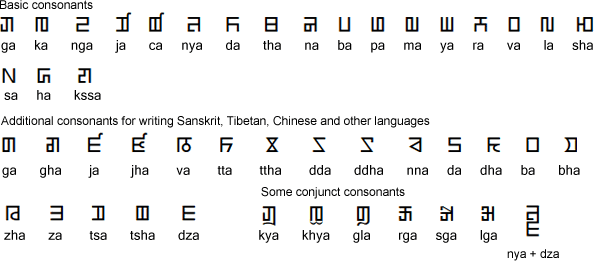The Mongolian Horizontal Square Script, (Хэвтээ Дөрвөлжин бичиг / Xäwtää Dörböljin in Mongolian) was invented in the late 17th century by Bogdo Zanabazar, a Mongolian monk and scholar, who also created the Soyombo script. The Mongolian Horizontal Square Script was based on the Tibetan script, was rediscovered in 1801 it is uncertain how it was used. Only a few documents in this script survive.
When the are used independently of vowels are indicated by adding a diacrit to the symbol for a. The diacritics are attached to consonants when the vowels follow consonants



Source: ftp://ftp.dante.de/pub/tex/languages/mongolian/mxd/doc/mxd4tex.pdf
Information about Mongolian | Soyombo Script | Mongolian Square Script | Galik Alphabet | Phrases | Numbers | Tower of Babel | Learning materials
Information about the Mongolian Horizontal Square Script
http://std.dkuug.dk/jtc1/sc2/wg2/docs/n4041.pdf
Information about the Mongolian language and Mongolia
http://en.wikipedia.org/wiki/Mongolian_language
http://www.mongoluls.net
http://www.sytra.cn/mongolian-translations-service.html
http://www.cjvlang.com/Writing/writmongol/mongolalpha.html
http://silverhorde.viahistoria.com/main.html
Alasha, Barin, Buryat, Chakhar, Daur, Jarud, Kalmyk, Khamnigan Mongol, Khorchin, Mogholi, Mongolian, Monguor, Santa / Dongxiang
Ahom, Aima, Arleng, Badagu, Badlit, Basahan, Balinese, Balti-A, Balti-B, Batak, Baybayin, Bengali, Bhaiksuki, Bhujimol, Bilang-bilang, Bima, Blackfoot, Brahmi, Buhid, Burmese, Carrier, Chakma, Cham, Cree, Dehong Dai, Devanagari, Dham Lipi, Dhankari / Sirmauri, Ditema, Dives Akuru, Dogra, Ethiopic, Evēla Akuru, Fox, Fraser, Gond, Goykanadi, Grantha, Gujarati, Gunjala Gondi, Gupta, Gurmukhi, Halbi Lipi, Hanifi, Hanuno'o, Hočąk, Ibalnan, Incung, Inuktitut, Jaunsari Takri, Javanese, Kaithi, Kadamba, Kamarupi, Kannada, Kawi, Kharosthi, Khema, Khe Prih, Khmer, Khojki, Khudabadi, Kirat Rai, Kōchi, Kodava Lipi, Komering, Kulitan, Kurukh Banna, Lai Tay (Tai Yo), Lampung, Lanna, Lao, Leke, Lepcha, Limbu, Lontara/Makasar, Lota Ende, Magar Akkha, Mahajani, Malayalam, Meitei (Modern), Manpuri (Old), Marchen, Meetei Yelhou Mayek, Meroïtic, Masarm Gondi, Modi, Mon, Mongolian Horizontal Square Script, Multani, Nandinagari, Newa, New Tai Lue, Ojibwe, Odia, Ogan, Pahawh Hmong, Pallava, Phags-pa, Purva Licchavi, Qiang / Rma, Ranjana, Rejang (Kaganga), Sasak, Savara, Satera Jontal, Shan, Sharda, Sheek Bakrii Saphaloo, Siddham, Sinhala, Sorang Sompeng, Sourashtra, Soyombo, Sukhothai, Sundanese, Syloti Nagri, Tagbanwa, Tai Noi, Takri, Tamil, Tanchangya (Ka-Pat), Tani, Thaana, Telugu, Thai, Thirke, Tibetan, Tigalari, Tikamuli, Tocharian, Tolong Siki, Vatteluttu, Warang Citi
Page last modified: 16.03.23
[top]
You can support this site by Buying Me A Coffee, and if you like what you see on this page, you can use the buttons below to share it with people you know.

If you like this site and find it useful, you can support it by making a donation via PayPal or Patreon, or by contributing in other ways. Omniglot is how I make my living.
Note: all links on this site to Amazon.com, Amazon.co.uk
and Amazon.fr
are affiliate links. This means I earn a commission if you click on any of them and buy something. So by clicking on these links you can help to support this site.
[top]